新视野大学英语课文 Section B 翻译
新视野大学英语第一册课文翻译Unit2-text-b

父母的对话桑迪离家上学后,简.芬奇平静地坐下来喝咖啡。
她一口一口慢慢地啜着,一面又试着去看报纸。
没过一会儿,她丈夫走了进来。
“史蒂夫,来杯咖啡吧?”简问道。
“不,谢谢,亲爱的。
我觉得烦透了,心乱如麻。
可能是因为那讨厌的音乐每天早上把我吵醒。
我想我还不至于老得落伍吧,可没完没了地听那毫无韵律、令人讨厌的歌曲实在让我生气。
它们毫无寓意。
我不相信桑迪真会喜欢这种音乐。
”“你知道,亲爱的,不同年龄的人喜欢不同的音乐,”简劝说道。
“还记得我们听过的一些音乐吗?”史蒂夫笑了,“你说得有道理。
也许,吃点早饭能消除我心头的烦恼。
”“我来给你拿点水果汁,”她主动说道,边说边站了起来。
“行了,”史蒂夫说,“我去拿,你看报纸吧。
”“我也不是真的在看报纸。
我思想集中不起来。
我也一直在想桑迪的事。
”史蒂夫摆好了早餐,然后坐到妻子身边。
她分了一些报纸给他,俩人都试着看会儿报纸。
接着简打破了沉默。
“你注意到了吗,今天早晨我们那15岁的女儿都化了什么样的妆?我问她时,她说她描眼线已几个月了。
我真不敢相信自己一直没有注意到。
我想我们应该感到幸运,因为我们与女儿之间的最大问题还只是化妆。
我看到其他青少年在镇上到处游手好闲,还纹身,浑身穿了许多洞,在眉毛上,鼻子上,到处都穿。
我想他们是在表达着他们的自我与本色,可这种表达方式与我们过去完全不一样。
”“完全不一样?”史蒂夫问道。
“我记得自己曾经不听父母的话,留着长头发。
你还记得吗?头发那么长,都长过肩膀了。
”“而且你还差点儿被学校开除,”简补充道。
“的确如此,可头发毕竟能剪短纹身就永远留在那里了。
在我看,纹身是种极端。
”“实际上,纹身也是可以去掉的,”简说。
“但去掉它很痛,很贵,可毕竟是可以去掉的。
好像每一代人都要找到自己的本色。
”“令我担心的是,”史蒂夫说,“音乐会传达一种非常消极的信息。
它对桑迪可能有负面的影响。
我不知道我们的小姑娘到底怎么回事。
她在变,我很担心她。
化妆品,糟糕的音乐,谁知道以后还会有什么花样?我们得和她谈谈。
新视野大学英语第三册sectionB原文翻译
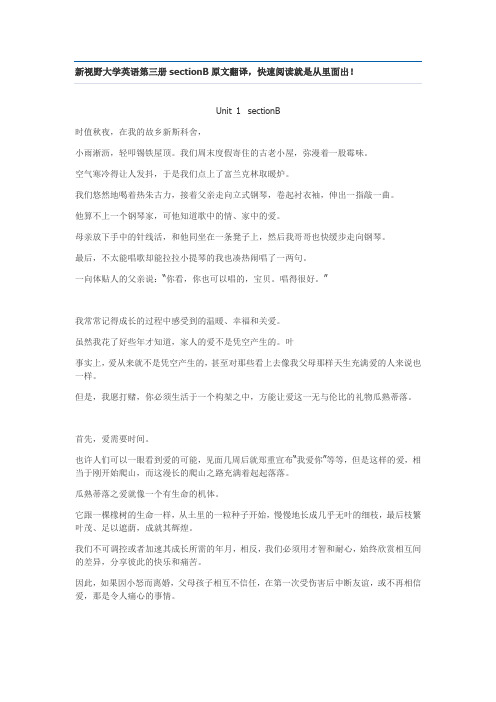
新视野大学英语第三册sectionB原文翻译,快速阅读就是从里面出!Unit 1 sectionB时值秋夜,在我的故乡新斯科舍,小雨淅沥,轻叩锡铁屋顶。
我们周末度假寄住的古老小屋,弥漫着一股霉味。
空气寒冷得让人发抖,于是我们点上了富兰克林取暖炉。
我们悠然地喝着热朱古力,接着父亲走向立式钢琴,卷起衬衣袖,伸出一指敲一曲。
他算不上一个钢琴家,可他知道歌中的情、家中的爱。
母亲放下手中的针线活,和他同坐在一条凳子上,然后我哥哥也快缓步走向钢琴。
最后,不太能唱歌却能拉拉小提琴的我也凑热闹唱了一两句。
一向体贴人的父亲说:“你看,你也可以唱的,宝贝。
唱得很好。
”我常常记得成长的过程中感受到的温暖、幸福和关爱。
虽然我花了好些年才知道,家人的爱不是凭空产生的。
叶事实上,爱从来就不是凭空产生的,甚至对那些看上去像我父母那样天生充满爱的人来说也一样。
但是,我愿打赌,你必须生活于一个构架之中,方能让爱这一无与伦比的礼物瓜熟蒂落。
首先,爱需要时间。
也许人们可以一眼看到爱的可能,见面几周后就郑重宣布“我爱你”等等,但是这样的爱,相当于刚开始爬山,而这漫长的爬山之路充满着起起落落。
瓜熟蒂落之爱就像一个有生命的机体。
它跟一棵橡树的生命一样,从土里的一粒种子开始,慢慢地长成几乎无叶的细枝,最后枝繁叶茂、足以遮荫,成就其辉煌。
我们不可调控或者加速其成长所需的年月,相反,我们必须用才智和耐心,始终欣赏相互间的差异,分享彼此的快乐和痛苦。
因此,如果因小怒而离婚,父母孩子相互不信任,在第一次受伤害后中断友谊,或不再相信爱,那是令人痛心的事情。
我们常常未经深思熟虑就向某人说“再见”,结果付出了非常昂贵的感情代价。
我曾经认识一对父子,他们被各自的生活困难困扰,多年来距离越拉越远,结果相互间几乎没话可说,而相互间没了依靠,他们的生活变得空虚。
儿子大学毕业后的那个夏天,打算开着黄色老卡车到连通全国的双车道公路上周游一番(那时还没有免费高速公路)。
新视野大学英语第二版第二册课文翻译 Unit 1-Section B
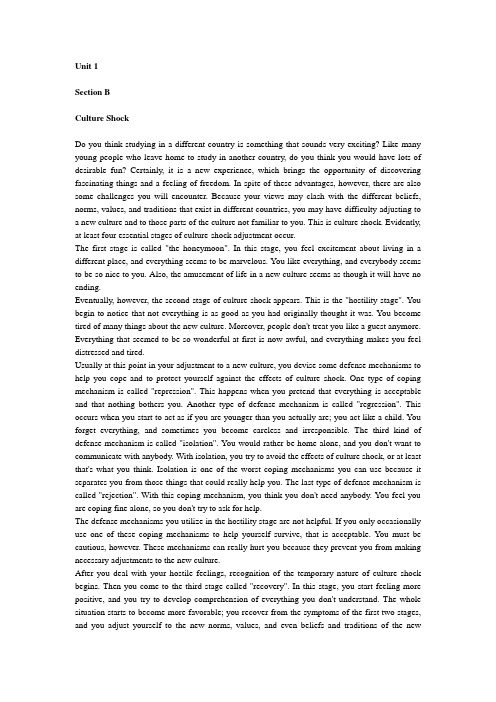
Unit 1Section BCulture ShockDo you think studying in a different country is something that sounds very exciting? Like many young people who leave home to study in another country, do you think you would have lots of desirable fun? Certainly, it is a new experience, which brings the opportunity of discovering fascinating things and a feeling of freedom. In spite of these advantages, however, there are also some challenges you will encounter. Because your views may clash with the different beliefs, norms, values, and traditions that exist in different countries, you may have difficulty adjusting to a new culture and to those parts of the culture not familiar to you. This is culture shock. Evidently, at least four essential stages of culture-shock adjustment occur.The first stage is called "the honeymoon". In this stage, you feel excitement about living in a different place, and everything seems to be marvelous. You like everything, and everybody seems to be so nice to you. Also, the amusement of life in a new culture seems as though it will have no ending.Eventually, however, the second stage of culture shock appears. This is the "hostility stage". You begin to notice that not everything is as good as you had originally thought it was. You become tired of many things about the new culture. Moreover, people don't treat you like a guest anymore. Everything that seemed to be so wonderful at first is now awful, and everything makes you feel distressed and tired.Usually at this point in your adjustment to a new culture, you devise some defense mechanisms to help you cope and to protect yourself against the effects of culture shock. One type of coping mechanism is called "repression". This happens when you pretend that everything is acceptable and that nothing bothers you. Another type of defense mechanism is called "regression". This occurs when you start to act as if you are younger than you actually are; you act like a child. You forget everything, and sometimes you become careless and irresponsible. The third kind of defense mechanism is called "isolation". You would rather be home alone, and you don't want to communicate with anybody. With isolation, you try to avoid the effects of culture shock, or at least that's what you think. Isolation is one of the worst coping mechanisms you can use because it separates you from those things that could really help you. The last type of defense mechanism is called "rejection". With this coping mechanism, you think you don't need anybody. You feel you are coping fine alone, so you don't try to ask for help.The defense mechanisms you utilize in the hostility stage are not helpful. If you only occasionally use one of these coping mechanisms to help yourself survive, that is acceptable. You must be cautious, however. These mechanisms can really hurt you because they prevent you from making necessary adjustments to the new culture.After you deal with your hostile feelings, recognition of the temporary nature of culture shock begins. Then you come to the third stage called "recovery". In this stage, you start feeling more positive, and you try to develop comprehension of everything you don't understand. The whole situation starts to become more favorable; you recover from the symptoms of the first two stages, and you adjust yourself to the new norms, values, and even beliefs and traditions of the newcountry. You begin to see that even though the distinctions of the culture are different from your own, it has elements that you can learn to appreciate.The last stage of culture shock is called "adjustment". In this stage, you have reached a point where you actually feel good because you have learned enough to understand the new culture. The things that initially made you feel uncomfortable or strange are now things that you understand. This acquisition of understanding alleviates much of the stress. Now you feel comfortable; you have adjusted to the new culture.Evidently, culture shock is something you cannot avoid when living in a foreign country. It does not seem like a very helpful experience when you are going through its four stages. However, when you have completely adjusted to a new culture you can more fully enjoy it. You learn how to interact with other people, and you learn a considerable amount about life in a culture that is not your own. Furthermore, learning about other cultures and how to adjust to the shock of living in them helps you learn more about yourself.Words: 753。
最新新视野大学英语第二版第二册课文翻译Unit-3-Section-B

Unit 3Section BRich Meeting His Future Mother-in-lawAfter much thought, I came up with a brilliant plan for Rich to meet my mother and win her over. In fact, I arranged it so my mother would want to cook a meal especially for him.One day, my mother called me, to invite me to a birthday dinner for my father. My brother Vincent was bringing his girlfriend, Lisa Lum. I could bring a friend, too.I knew she would do this, because cooking was how my mother expressed her love, her pride, her power, her proof that she knew more than any one else. "Just be sure to tell her later that her cooking was the best you ever tasted," I told Rich. "Believe me."The eve of the dinner, I sat in the kitchen watching her cook, waiting for the right moment to tell her about our marriage plans, that we had decided to get married next July, about seven months away. She was cubing garlic and slicing cabbage into small pieces and chatting at the same time about Auntie Suyuan: "She can only cook looking at directions. My instructions are in my fingers.I know what secret ingredients to put in just by using my nose!" And she was slicing so quickly, seemingly not paying attention to her sharp chopping knife, that I was afraid the tips of her fingers would become one of the ingredients of the purple vegetable and pork dish.I was hoping she would say something first concerning Rich. I had seen her expression when she opened the door, her forced smile as she surveyed him from head to toe, checking her judgment of him against that already given to her by Auntie Suyuan. I tried to anticipate what criticisms she would have.Rich was not only not Chinese, he was also my junior, a few years younger than I was. And unfortunately, he looked much younger with his curly red hair, smooth pale skin, and the splash of orange freckles across his nose. He was a bit on the short side, compactly built. In his dark business suits, he looked nice but easily forgettable, like somebody's nephew at a funeral. This was why I didn't notice him the first year we worked together at the firm. But, my mother noticed everything."So what do you think of Rich?" I finally asked, holding my breath.She tossed the garlic in the hot oil which bubbled in a loud, angry sound. "So many spots on his face," she said.I could feel the goose bumps rise on my back. "They're freckles. Freckles are good luck, you know," I felt compelled to defend on his behalf, a bit too heatedly as I raised my voice above the noise of the kitchen."Oh?" she said innocently."Yes, the more spots the better. Everybody knows that."She considered this a moment and then smiled and spoke in a Chinese dialect: "Maybe this is true. When you were young, you got the chicken pox. So many spots, you had to stay home for ten days. So lucky, you thought."I couldn't save Rich in the kitchen. And I couldn't save him later at the dinner table either.He had brought a bottle of French wine, something he did not know my parents could notappreciate. My parents did not even own appropriate glasses for wine. And then he also made the mistake of drinking not one but two frosted glasses full, while everybody else had a half-inch "just for taste."But the worst happened when Rich criticized my mother's cooking, and he didn't even have a clue about what he had done. As is the Chinese cook's custom, my mother always made negative remarks about her own cooking. That night she chose to direct it toward her famous steamed pork and preserved vegetable dish, which she always served with special pride."Ai! This dish not salty enough, no flavor," she complained, after tasting a small bite. "It is too bad to eat."This was our family's cue to eat some and proclaim it the best she had ever made. But before we could be so diplomatic, Rich said, "You know, all it needs is a little soy sauce." And he proceeded to pour a riverful of the salty black stuff on the china plate, right before my mother's shocked eyes. And even though I was hopeful throughout the dinner that my mother would somehow see Rich's kindness, his sense of humor and charm, I knew he had failed miserably in her eyes.Rich obviously had had a different opinion on how the evening had gone. When we got home that night, after we put Shoshana to bed, he said modestly, "Well, I think we hit it off A-OK." Words: 792。
新视野大学英语读写教程第四册第二单元B篇原文和翻译
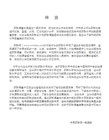
The Political Career of a Female Politician
Modest and soft-spoken, Agatha Muthoni Mbogo, 24, is hardly the image of a revolutionary. Yet, six months ago, she did a most revolutionary thing: She ran for mayor of Embu, Kenya, and won. Ms. Mbogo's victory was even more surprising because she was voted in by her colleagues on the District Council, all men. For the thousands of women in this farming area two hours northeast of Nairobi, Ms. Mbogo suddenly became a symbol of the increasingly powerful political force women have become in Kenya and across Africa. Ms. Mbogo launched her dream of a career in politics in 1992 by running for the Embu Council, facing the obstacles that often trouble African women running for political office. She had little money. She had no political experience.
新视野大学英语1 sectionB文章英译汉翻译
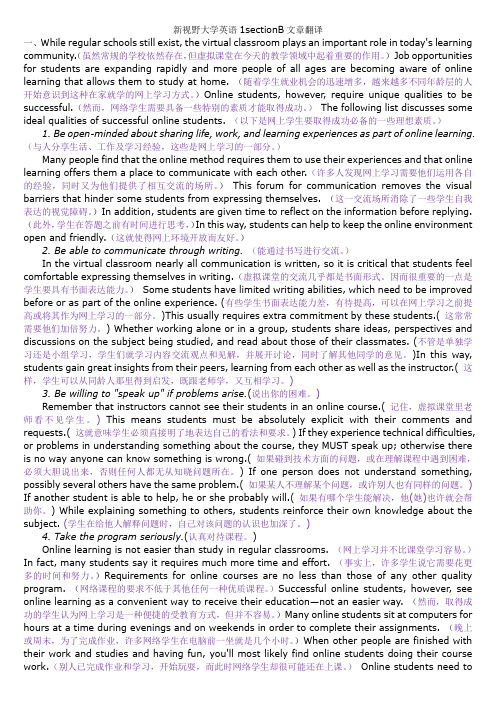
新视野大学英语1sectionB文章翻译一、While regular schools still exist, the virtual classroom plays an important role in today's learning community.(虽然常规的学校依然存在,但虚拟课堂在今天的教学领域中起着重要的作用。
)Job opportunities for students are expanding rapidly and more people of all ages are becoming aware of online learning that allows them to study at home. (随着学生就业机会的迅速增多,越来越多不同年龄层的人开始意识到这种在家就学的网上学习方式。
)Online students, however, require unique qualities to be successful.(然而,网络学生需要具备一些特别的素质才能取得成功。
)The following list discusses some ideal qualities of successful online students. (以下是网上学生要取得成功必备的一些理想素质。
)1. Be open-minded about sharing life, work, and learning experiences as part of online learning.(与人分享生活、工作及学习经验,这些是网上学习的一部分。
)Many people find that the online method requires them to use their experiences and that online learning offers them a place to communicate with each other.(许多人发现网上学习需要他们运用各自的经验,同时又为他们提供了相互交流的场所。
新视野大学英语第二版第二册课文翻译unit2-sectionb
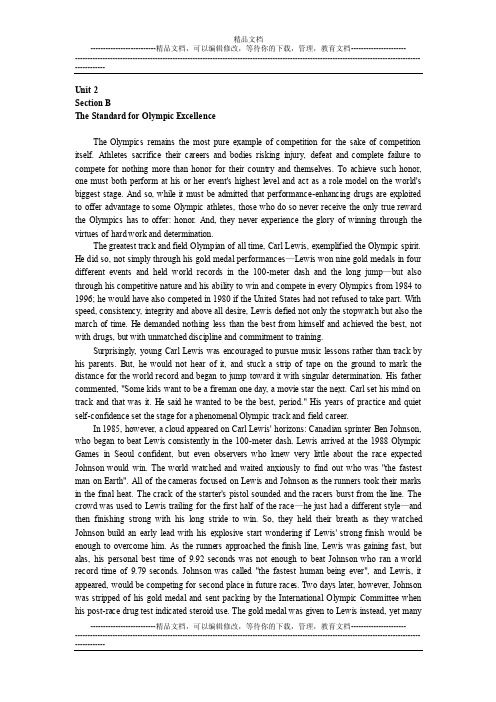
Unit 2Section BThe Standard for Olympic ExcellenceThe Olympics remains the most pure example of competition for the sake of competition itself. Athletes sacrifice their careers and bodies risking injury, defeat and complete failure to compete for nothing more than honor for their country and themselves. To achieve such honor, one must both perform at his or her event's highest level and act as a role model on the world's biggest stage. And so, while it must be admitted that performance-enhancing drugs are exploited to offer advantage to some Olympic athletes, those who do so never receive the only true reward the Olympics has to offer: honor. And, they never experience the glory of winning through the virtues of hard work and determination.The greatest track and field Olympian of all time, Carl Lewis, exemplified the Olympic spirit. He did so, not simply through his gold medal performances—Lewis won nine gold medals in four different events and held world records in the 100-meter dash and the long jump—but also through his competitive nature and his ability to win and compete in every Olympics from 1984 to 1996; he would have also competed in 1980 if the United States had not refused to take part. With speed, consistency, integrity and above all desire, Lewis defied not only the stopwatch but also the march of time. He demanded nothing less than the best from himself and achieved the best, not with drugs, but with unmatched discipline and commitment to training.Surprisingly, young Carl Lewis was encouraged to pursue music lessons rather than track by his parents. But, he would not hear of it, and stuck a strip of tape on the ground to mark the distance for the world record and began to jump toward it with singular determination. His father commented, "Some kids want to be a fireman one day, a movie star the next. Carl set his mind on track and that was it. He said he wanted to be the best, period." His years of practice and quiet self-confidence set the stage for a phenomenal Olympic track and field career.In 1985, however, a cloud appeared on Carl Lewis' horizons: Canadian sprinter Ben Johnson, who began to beat Lewis consistently in the 100-meter dash. Lewis arrived at the 1988 Olympic Games in Seoul confident, but even observers who knew very little about the race expected Johnson would win. The world watched and waited anxiously to find out who was "the fastest man on Earth". All of the cameras focused on Lewis and Johnson as the runners took their marks in the final heat. The crack of the starter's pistol sounded and the racers burst from the line. The crowd was used to Lewis trailing for the first half of the race—he just had a different style—and then finishing strong with his long stride to win. So, they held their breath as they watched Johnson build an early lead with his explosive start wondering if Lewis' strong finish would be enough to overcome him. As the runners approached the finish line, Lewis was gaining fast, but alas, his personal best time of 9.92 seconds was not enough to beat Johnson who ran a world record time of 9.79 seconds. Johnson was called "the fastest human being ever", and Lewis, it appeared, would be competing for second place in future races. Two days later, however, Johnson was stripped of his gold medal and sent packing by the International Olympic Committee when his post-race drug test indicated steroid use. The gold medal was given to Lewis instead, yet many --------------------------精品文档,可以编辑修改,等待你的下载,管理,教育文档----------------------------------------------------------------------------------------------------------------------------------------------------------------did not see his conquest as a real victory, and he became swept up in the apparent blanket condemnation of the sport. Worse, a former opponent charged Lewis with steroid use. Lewis firmly denied the charges and countered by proving before a judge that the magazine that had published the stories did so without foundation to their claims. He also participated in drug test after drug test to prove he was clean. An opponent of steroid use, Lewis was never linked to drug use by anything but rumor.It would take the formula of Lewis' further commitment to the sport and his love for competition to lift some of the suspicion from track events and stop the erosion of support that the Olympics began to suffer after Seoul. With his continued hard work and honest participation in sprinting and the long jump, he proved to the world that the Olympic spirit was not dead. And in 1992, Lewis competed in his third Olympics winning two more gold medals in the long jump and 4×100 meter relay with a reception from the public that was fit for a king.The amazing Carl Lewis had demonstrated that he was unlike any athlete who had ever lived, not by simply winning, but by winning honestly, loving to compete and working the hardest for the longest time. His love for the games truly set a new standard for Olympic excellence. (Words: 835)--------------------------精品文档,可以编辑修改,等待你的下载,管理,教育文档----------------------------------------------------------------------------------------------------------------------------------------------------------------。
新视野B2U1 Text B课文详解(带课文翻译)
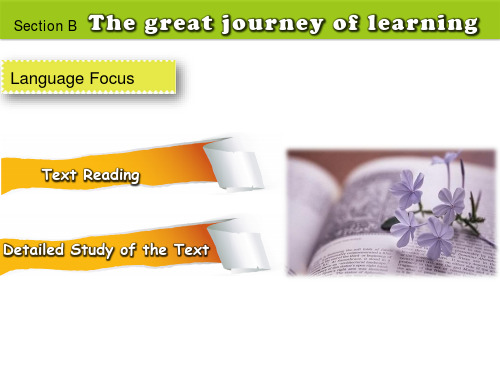
Section B T h e g re a t j o u r n ey o f l e a r n i n g
Text Reading
4 Malcolm X’s considerable frustration at his inability to read and write launched him on a quest to overcome his deficiencies. He said, “I saw that the best thing I could do was get hold of a dictionary – to study, to learn some words.” And he was lucky enough to reason also that he should try to improve his handwriting. “It was sad. I couldn’t even write in a straight line,” he told us. These ideas together moved him to appeal to the prison authorities for some paper and pencils.
Section B T h e g re a t j o u r n ey o f l e a r n i n g
Text Reading
6 Malcolm X depicted how the next morning when he woke up, he kept thinking about the words he had copied and read aloud and about the acquisition of the knowledge he was pursuing. It was a marvelous feeling. He felt immensely proud.
新视野大学英语第二版第二册课文翻译Unit 7-Section B
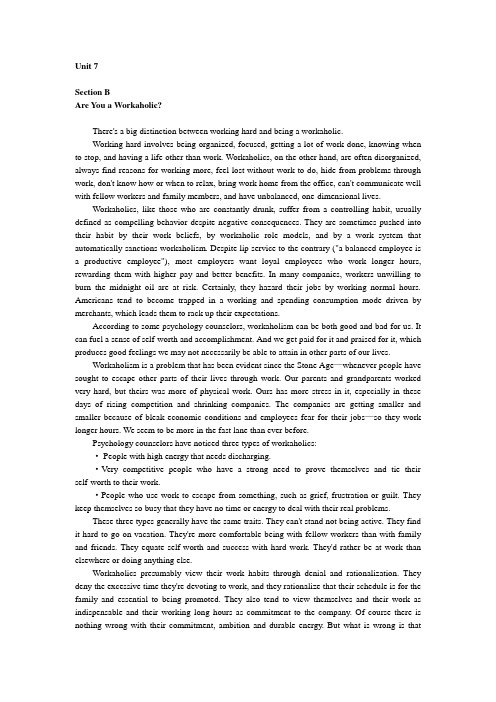
Unit 7Section BAre You a Workaholic?There's a big distinction between working hard and being a workaholic.Working hard involves being organized, focused, getting a lot of work done, knowing when to stop, and having a life other than work. Workaholics, on the other hand, are often disorganized, always find reasons for working more, feel lost without work to do, hide from problems through work, don't know how or when to relax, bring work home from the office, can't communicate well with fellow workers and family members, and have unbalanced, one-dimensional lives.Workaholics, like those who are constantly drunk, suffer from a controlling habit, usually defined as compelling behavior despite negative consequences. They are sometimes pushed into their habit by their work beliefs, by workaholic role models, and by a work system that automatically sanctions workaholism. Despite lip service to the contrary ("a balanced employee is a productive employee"), most employers want loyal employees who work longer hours, rewarding them with higher pay and better benefits. In many companies, workers unwilling to burn the midnight oil are at risk. Certainly, they hazard their jobs by working normal hours. Americans tend to become trapped in a working and spending consumption mode driven by merchants, which leads them to rack up their expectations.According to some psychology counselors, workaholism can be both good and bad for us. It can fuel a sense of self-worth and accomplishment. And we get paid for it and praised for it, which produces good feelings we may not necessarily be able to attain in other parts of our lives.Workaholism is a problem that has been evident since the Stone Age—whenever people have sought to escape other parts of their lives through work. Our parents and grandparents worked very hard, but theirs was more of physical work. Ours has more stress in it, especially in these days of rising competition and shrinking companies. The companies are getting smaller and smaller because of bleak economic conditions and employees fear for their jobs—so they work longer hours. We seem to be more in the fast lane than ever before.Psychology counselors have noticed three types of workaholics:· People with high energy that needs discharging.·Very competitive people who have a strong need to prove themselves and tie their self-worth to their work.·People who use work to escape from something, such as grief, frustration or guilt. They keep themselves so busy that they have no time or energy to deal with their real problems.These three types generally have the same traits. They can't stand not being active. They find it hard to go on vacation. They're more comfortable being with fellow workers than with family and friends. They equate self-worth and success with hard work. They'd rather be at work than elsewhere or doing anything else.Workaholics presumably view their work habits through denial and rationalization. They deny the excessive time they're devoting to work, and they rationalize that their schedule is for the family and essential to being promoted. They also tend to view themselves and their work as indispensable and their working long hours as commitment to the company. Of course there is nothing wrong with their commitment, ambition and durable energy. But what is wrong is thatthese things often come in at a high price to their health and the welfare of their families.As workaholics tend to put all their eggs in one basket, their job, spreading these eggs into several baskets can help them. Psychology counselors, for example, often help these people by asking about the hobbies they enjoyed in the past and don't have anymore. That kind of question can often get them started toward regaining more of a balance in their lives.To be a healthy person physically and psychologically, one should lead a balanced life, some psychology experts summarize. Those little things—reading mystery novels, playing volleyball, spending time with family and friends, playing with the dog, going fishing—may seem relatively insignificant means to a healthy end. But, they can be at least as rewarding as work.(Words: 683)。
新视野大学英语读写教程第二版第三册课文翻译完整版

新视野大学英语读写教程第二版第三册课文翻译集团标准化办公室:[VV986T-J682P28-JP266L8-68PNN]U n i t1s e c t i o n A我哥哥吉米出生时遇上难产,因为缺氧导致大脑受损。
两年后,我出生了。
从此以后,我的生活便围绕我哥哥转。
伴随我成长的,是“到外面去玩,把你哥哥也带上。
”不带上他,我是哪里也去不了的。
因此,我怂恿邻居的孩子到我家来,尽情地玩孩子们玩的游戏。
我母亲教吉米学习日常自理,比如刷牙或系皮带什么的。
我父亲宅心仁厚,他的耐心和理解使一家人心贴着心。
我则负责外面的事,找到那些欺负我哥哥的孩子们的父母,告他们的状,为我哥哥讨回公道。
父亲和吉米形影不离。
他们一道吃早饭,平时每天早上一道开车去海军航运中心,他们都在那里工作,吉米在那搬卸标有彩色代号的箱子。
晚饭后,他们一道交谈,玩游戏,直到深夜。
他们甚至用口哨吹相同的曲调。
所以,父亲1991年因心脏病去世时,吉米几乎崩溃了,尽管他尽量不表现出来。
他就是不能相信父亲去世这一事实。
通常,他是一个令人愉快的人,现在却一言不发,无论说多少话都不能透过他木然的脸部表情了解他的心事。
我雇了一个人和他住在一起,开车送他去上班。
然而,不管我怎么努力地维持原状,吉米还是认为他熟悉的世界已经消失了。
有一天,我问他:“你是不是想念爸爸?”他的嘴唇颤抖了几下,然后问我:“你怎么看,玛格丽特?他是我最好的朋友。
”接着,我俩都流下了眼泪六个月后,母亲因肺癌去世,剩下我一人来照顾吉米。
吉米不能马上适应去上班时没有父亲陪着,因此搬来纽约和我一起住了一段时间。
我走到哪里他就跟到哪里,他好像适应得很好。
但吉米依然想住在我父母的房子里,继续干他原来的工作。
我答应把他送回去。
此事最后做成了。
如今,他在那里生活了11年,在许多人的照料下,同时依靠自己生活得有声有色。
他已成了邻里间不可或缺的人物。
如果你有邮件要收,或有狗要遛,他就是你所要的人。
当然,母亲的话没错:可以有一个家,既能容纳他的缺陷又能装下我的雄心。
新视野大学英语(第二版)读写教程第四册课文翻译(最新完整版)
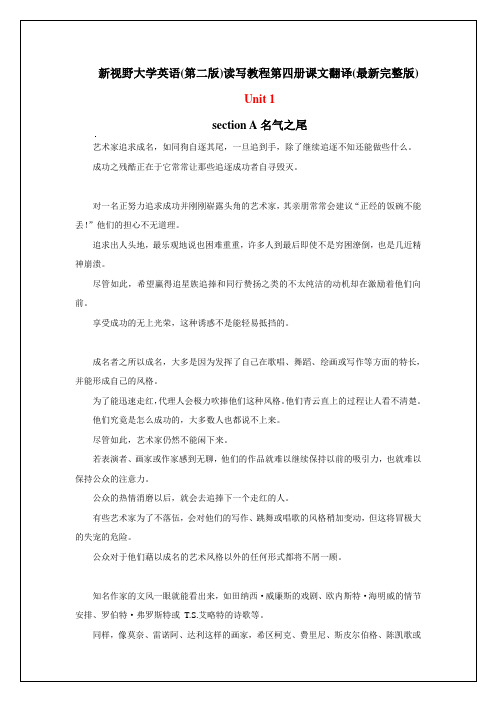
新视野大学英语(第二版)读写教程第四册课文翻译(最新完整版)Unit 1section A名气之尾艺术家追求成名,如同狗自逐其尾,一旦追到手,除了继续追逐不知还能做些什么。
成功之残酷正在于它常常让那些追逐成功者自寻毁灭。
对一名正努力追求成功并刚刚崭露头角的艺术家,其亲朋常常会建议“正经的饭碗不能丢!”他们的担心不无道理。
追求出人头地,最乐观地说也困难重重,许多人到最后即使不是穷困潦倒,也是几近精神崩溃。
尽管如此,希望赢得追星族追捧和同行赞扬之类的不太纯洁的动机却在激励着他们向前。
享受成功的无上光荣,这种诱惑不是能轻易抵挡的。
成名者之所以成名,大多是因为发挥了自己在歌唱、舞蹈、绘画或写作等方面的特长,并能形成自己的风格。
为了能迅速走红,代理人会极力吹捧他们这种风格。
他们青云直上的过程让人看不清楚。
他们究竟是怎么成功的,大多数人也都说不上来。
尽管如此,艺术家仍然不能闲下来。
若表演者、画家或作家感到无聊,他们的作品就难以继续保持以前的吸引力,也就难以保持公众的注意力。
公众的热情消磨以后,就会去追捧下一个走红的人。
有些艺术家为了不落伍,会对他们的写作、跳舞或唱歌的风格稍加变动,但这将冒极大的失宠的危险。
公众对于他们藉以成名的艺术风格以外的任何形式都将不屑一顾。
知名作家的文风一眼就能看出来,如田纳西·威廉斯的戏剧、欧内斯特·海明威的情节安排、罗伯特·弗罗斯特或T.S.艾略特的诗歌等。
同样,像莫奈、雷诺阿、达利这样的画家,希区柯克、费里尼、斯皮尔伯格、陈凯歌或张艺谋这样的电影制作人也是如此。
他们鲜明独特的艺术风格标志着与别人不同的艺术形式上的重大变革,这让他们名利双收,但也让他们付出了代价,那就是失去了用其他风格或形式表现自我的自由。
名气这盏聚光灯可比热带丛林还要炙热。
骗局很快会被揭穿,过多的关注带来的压力会让大多数人难以承受。
它让你失去自我。
你必须是公众认可的那个你,而不是真实的你或是可能的你。
新视野大学英语第二版第二册课文翻译Unit8-SectionB

新视野⼤学英语第⼆版第⼆册课⽂翻译Unit8-SectionBUnit 8Section BWhat Youngsters Expect in LifeBack in the good old days of stable economic expansion—the 1950s and 1960s—a person could choose to do something new, exciting, and creative in life but could also choose to say, "That's not for me: I am going to play it safe in life. I am going to stay in my home town and have a nice comfortable career in a salaried job." That second choice no longer exists for the vast majority of Americans. All of us are going to be creators and pioneers over the next 10 years whether we like it or not, and many of us don't like it.Just look at what the attitude surveys tell us. In the United States, three-quarters of the adults surveyed by the Harris Poll and two-thirds of all high-school seniors surveyed by Scholastic magazine say they believe that the United States will be a worse place 10 years from now than it is today. No wonder young people are disaffected. No wonder they are not motivated to learn. They think the world in which they are going to spend their lives won't be a very satisfactory place.Young men, in particular, are not happy with their prospects for the future. When surveyors ask US female high-school students what they are going to do when they graduate, they list all kinds of roles they want to fill, like doctors, lawyers, engineers, accountants, civil servants, police and firemen, and fighter pilots. In short, they want to do all the things that men have always done. Moreover, less than 10% of female high-school seniors expect to spend their adult lives solely as mothers and domestic managers, while nearly 90% are committed to having both a career and a marriage based on equality.By comparison, nearly half of male high-school students express their preference for a traditional, male-headed, one provider, nuclear family, where the wife stays home as mother and housewife. And when male high-school students are asked what kinds of careers they would like to have, the only two job fields that consistently receive large numbers of responses in open surveys are "professional athlete" and "media personality". A large proportion of America's young men—one third or more—simply say they don't know what they're going to do as adults.If these people do not acquire some constructive vision of purpose for themselves, they are likely to be very destructive forces of resistance in society throughout their lives. We already see that. One recent estimate is that one-sixth of all 14- to 24-year-olds in America—mostly males—are currently "disaffected and disconnected". They are not associated with any formal role in society, nor are they in any formal relationship with another person. These are the folks who are joining the gangs in inner cities and swelling the ranks of the rural military gangs. They see no roles for themselves in an Information Age society, and they are angry about their empty future.So this is a very pregnant moment, not only for the future of America, but also for all of the mature industrial economies and, ultimately, for the world at large. It is an uncertain moment, a scary moment. It is the kind of moment in history when, to summarize in the words of Alfred North Whitehead, familiar patterns fade, familiar solutions fail, and familiar options disappear. Of course, the books and periodicals that are warning society about the removal of jobs, "the end of work", and wage decreases only serve to increase public anxiety—a slow-motion variation of shouting "Fire!" in a crowded theater. These alarming forecasts are largely simple projections of the past two or three decades ofworkplace trends. However, in the absence of plausible alternative explanations for the gloomy economic news of the past 15 to 20 years and the gloomier prospects implicit in the projections of those trends, industrial societies—fearful for the future —might very well take backward steps. These steps will principally serve the interests of the economically dominant groups who want to protect their assets and resources from the forces of change. Nations that take such steps will lose balance. Social and economic progress will grind to a halt and the negative side of this transformation will eliminate more and more jobs. The anger and frustration displayed by people who do not understand what is happening to them will be a terrible and dangerous force in all the major industrial economies.(Words: 747)。
新视野大学英语读写教程(第二版)第一册课文翻译
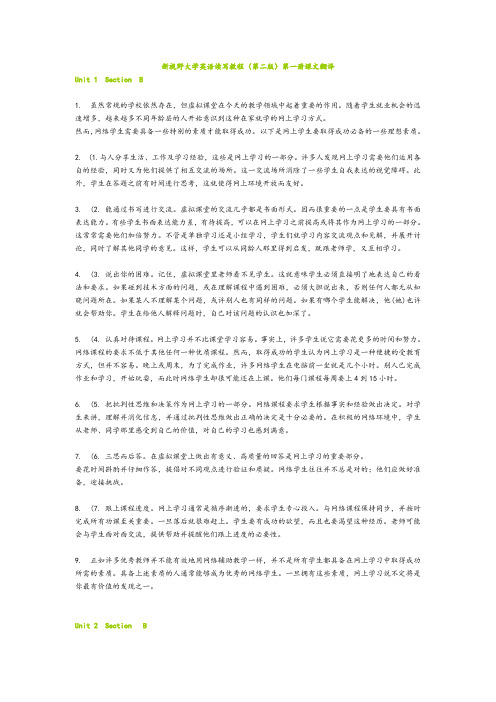
新视野大学英语读写教程(第二版)第一册课文翻译Unit 1 Section B1. 虽然常规的学校依然存在,但虚拟课堂在今天的教学领域中起着重要的作用。
随着学生就业机会的迅速增多,越来越多不同年龄层的人开始意识到这种在家就学的网上学习方式。
然而,网络学生需要具备一些特别的素质才能取得成功。
以下是网上学生要取得成功必备的一些理想素质。
2. (1.与人分享生活、工作及学习经验,这些是网上学习的一部分。
许多人发现网上学习需要他们运用各自的经验,同时又为他们提供了相互交流的场所。
这一交流场所消除了一些学生自我表达的视觉障碍。
此外,学生在答题之前有时间进行思考,这就使得网上环境开放而友好。
3. (2. 能通过书写进行交流。
虚拟课堂的交流几乎都是书面形式。
因而很重要的一点是学生要具有书面表达能力。
有些学生书面表达能力差,有待提高,可以在网上学习之前提高或将其作为网上学习的一部分。
这常常需要他们加倍努力。
不管是单独学习还是小组学习,学生们就学习内容交流观点和见解,并展开讨论,同时了解其他同学的意见。
这样,学生可以从同龄人那里得到启发,既跟老师学,又互相学习。
4. (3. 说出你的困难。
记住,虚拟课堂里老师看不见学生。
这就意味学生必须直接明了地表达自己的看法和要求。
如果碰到技术方面的问题,或在理解课程中遇到困难,必须大胆说出来,否则任何人都无从知晓问题所在。
如果某人不理解某个问题,或许别人也有同样的问题。
如果有哪个学生能解决,他(她)也许就会帮助你。
学生在给他人解释问题时,自己对该问题的认识也加深了。
5. (4. 认真对待课程。
网上学习并不比课堂学习容易。
事实上,许多学生说它需要花更多的时间和努力。
网络课程的要求不低于其他任何一种优质课程。
然而,取得成功的学生认为网上学习是一种便捷的受教育方式,但并不容易。
晚上或周末,为了完成作业,许多网络学生在电脑前一坐就是几个小时。
别人已完成作业和学习,开始玩耍,而此时网络学生却很可能还在上课。
新视野大学英语读写教程六 课文section B 翻译
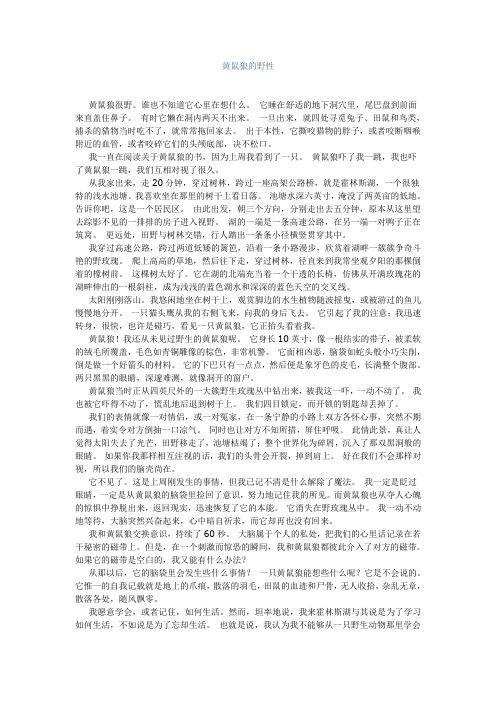
黄鼠狼的野性黄鼠狼很野。
谁也不知道它心里在想什么。
它睡在舒适的地下洞穴里,尾巴盘到前面来直盖住鼻子。
有时它懒在洞内两天不出来。
一旦出来,就四处寻觅兔子、田鼠和鸟类,捕杀的猎物当时吃不了,就常常拖回家去。
出于本性,它撕咬猎物的脖子,或者咬断咽喉附近的血管,或者咬碎它们的头颅底部,决不松口。
我一直在阅读关于黄鼠狼的书,因为上周我看到了一只。
黄鼠狼吓了我一跳,我也吓了黄鼠狼一跳,我们互相对视了很久。
从我家出来,走20分钟,穿过树林,跨过一座高架公路桥,就是霍林斯湖,一个很独特的浅水池塘。
我喜欢坐在那里的树干上看日落。
池塘水深六英寸,淹没了两英亩的低地。
告诉你吧,这是一个居民区。
由此出发,朝三个方向,分别走出去五分钟,原本从这里望去踪影不见的一排排的房子进入视野。
湖的一端是一条高速公路,在另一端一对鸭子正在筑窝。
更远处,田野与树林交错,行人踏出一条条小径横竖贯穿其中。
我穿过高速公路,跨过两道低矮的篱笆,沿着一条小路漫步,欣赏着湖畔一簇簇争奇斗艳的野玫瑰。
爬上高高的草地,然后往下走,穿过树林,径直来到我常坐观夕阳的那棵倒着的橡树前。
这棵树太好了。
它在湖的北端充当着一个干透的长椅,仿佛从开满玫瑰花的湖畔伸出的一根斜柱,成为浅浅的蓝色湖水和深深的蓝色天空的交叉线。
太阳刚刚落山。
我悠闲地坐在树干上,观赏脚边的水生植物随波摇曳,或被游过的鱼儿慢慢地分开。
一只猫头鹰从我的右侧飞来,向我的身后飞去。
它引起了我的注意;我迅速转身,很快,也许是碰巧,看见一只黄鼠狼,它正抬头看着我。
黄鼠狼!我还从未见过野生的黄鼠狼呢。
它身长10英寸,像一根结实的带子,被柔软的绒毛所覆盖,毛色如青铜雕像的棕色,非常机警。
它面相凶恶,脑袋如蛇头般小巧尖削,倒是做一个好箭头的材料。
它的下巴只有一点点,然后便是象牙色的皮毛,长满整个腹部。
两只黑黑的眼睛,深邃难测,就像洞开的窗户。
黄鼠狼当时正从四英尺外的一大簇野生玫瑰丛中钻出来,被我这一吓,一动不动了。
新视野大学英语第三版读写教程Book1-Unit1-sectionB课文及翻译

Unit1What we wish我们的期望My dear child,我亲爱的孩子:You are about to participate in the next leg of yourjourney through life. For us, this part is bittersweet.As you go off to college, exciting new worlds willop en up to you. They will inspire and challenge you; you will grow in incredibl e ways.你即将踏上人生的下一段旅程。
这让我们感到喜忧参半。
当你离家、步入大学的校门,激动人心的崭新世界将会展现在你面前。
这将带给你鼓舞,也会使你面临挑战;你将获得更大的进步与成长。
This is also a moment of sadness. Your departure to college makes it unden iably clear thatyou are no longer a child. There has been no greater joy than watching you arrive at thismoment. You have turned our greatest challenge i nto our greatest pride. Although we havebrought you to this point, it is hard to watch you depart. Remember above all things, we willmiss you.这也是令人伤感的时刻。
离家去上大学就明确意味着你不再是个孩子了。
没有什么比看到你走到今天这一步更令我们欣喜的了。
你曾经是我们最大的挑战,现在却成为我们最大的骄傲。
新视野大学英语B1U1 Text B 课文详解(带课文翻译)

Section B W h a t we w i s h
Text Reading
learning is about. You often ask, “Why do I need to know this?” I encourage you to stay inquisitive, but remember this: “Education is what remains after one has forgotten everything he learned in school.” What you learn is not as important as the fact that you learn. This is the heart of scholarship: moving from teacher-taught to master-inspired, on over to the point where you become a self-learner.
Section B W h a t we w i s h
Text Reading
curiosity away from you. Treasure your youth and the university experience before you. 8College is the time when you have: the first taste of independence, the greatest amount of free time, the most flexibility to change, the lowest cost for making mistakes. 9 Approach these years enthusiastically! Make the most of your time. Become the great thinker
(完整版)新视野大学英语第三版读写教程Book1-Unit1-sectionB课文及翻译
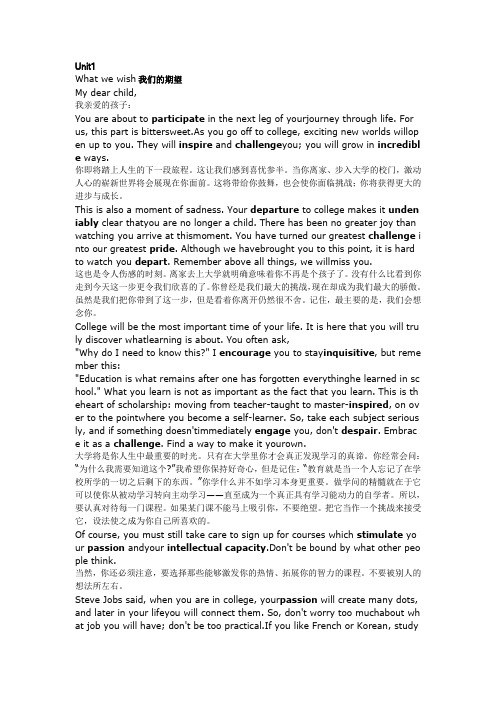
Unit1What we wish我们的期望My dear child,我亲爱的孩子:You are about to participate in the next leg of yourjourney through life. For us, this part is bittersweet.As you go off to college, exciting new worlds willop en up to you. They will inspire and challenge you; you will grow in incredibl e ways.你即将踏上人生的下一段旅程。
这让我们感到喜忧参半。
当你离家、步入大学的校门,激动人心的崭新世界将会展现在你面前。
这将带给你鼓舞,也会使你面临挑战;你将获得更大的进步与成长。
This is also a moment of sadness. Your departure to college makes it unden iably clear thatyou are no longer a child. There has been no greater joy than watching you arrive at thismoment. You have turned our greatest challenge i nto our greatest pride. Although we havebrought you to this point, it is hard to watch you depart. Remember above all things, we willmiss you.这也是令人伤感的时刻。
离家去上大学就明确意味着你不再是个孩子了。
没有什么比看到你走到今天这一步更令我们欣喜的了。
你曾经是我们最大的挑战,现在却成为我们最大的骄傲。
新视野大学英语第二册sectionAB课文翻译

UNIT 1 SECTION A美国人认为没有人能停止不前。
如果你不求进取,你就会落伍。
这种态度造就了一个投身于研究、实验和探索的民族。
时间是美国人注意节约的两个要素之一,另一要素是劳力。
人们一直说:“只有时间才能支配我们。
”人们似乎把时间当作一个差不多是实实在在的东西来对待。
我们安排时间、节约时间、浪费时间、挤抢时间、消磨时间、缩减时间、对时间的利用作出解释;我们还要因付出时间而收取费用。
时间是一种宝贵的资源,许多人都深感人生的短暂。
时光一去不复返。
我们应当让每一分钟都过得有意义。
外国人对美国的第一印象很可能是:每个人都匆匆忙忙──常常处于压力之下。
城里人看上去总是在匆匆地赶往他们要去的地方,在商店里他们焦躁不安地指望店员能马上来为他们服务,或者为了赶快买完东西,用肘来推搡他人。
白天吃饭时人们也都匆匆忙忙,这部分地反映出这个国家的生活节奏。
人们认为工作时间是宝贵的。
在公共用餐场所,人们都等着别人尽快吃完,以便他们也能及时用餐,你还会发现司机开车很鲁莽,人们推搡着在你身边过去。
你会怀念微笑、简短的交谈以及与陌生人的随意闲聊。
不要觉得这是针对你个人的,这是因为人们都非常珍惜时间,而且也不喜欢他人“浪费”时间到不恰当的地步。
许多刚到美国的人会怀念诸如商务拜访等场合开始时的寒暄。
他们也会怀念那种一边喝茶或喝咖啡一边进行的礼节性交流,这也许是他们自己国家的一种习俗。
他们也许还会怀念在饭店或咖啡馆里谈生意时的那种轻松悠闲的交谈。
一般说来,美国人是不会在如此轻松的环境里通过长时间的闲聊来评价他们的客人的,更不用说会在增进相互间信任的过程中带他们出去吃饭,或带他们去打高尔夫球。
既然我们通常是通过工作而不是社交来评估和了解他人,我们就开门见山地谈正事。
因此,时间老是在我们心中滴滴答答地响着。
因此,我们千方百计地节约时间。
我们发明了一系列节省劳力的装置;我们通过发传真、打电话或发电子邮件与他人迅速地进行交流,而不是通过直接接触。
新视野B2U2 Text B 课文详解(带课文翻译)

Section B W h a t c o l l e g e b r i n g s u s ?
xt Reading
3 Some adventuresome educators and campus watchers have openly begun to suggest that we revise our attitudes and reform the system. College may not be the best, the proper or even realistic place for every young person after the completion of high school. Critics suggest we may have been looking at all those surveys and statistics upside down through the rosy glow of our own remembered college experiences.
Section B W h a t c o l l e g e b r i n g s u s ?
Text Reading
2 The reality is that college has never been magical for everyone. Now that close to half our high school graduates are attending college, those who don’t fit the pattern are becoming more numerous. Excess college graduates are selling shoes and driving taxis.
新视野大学英语课文 Section B 翻译
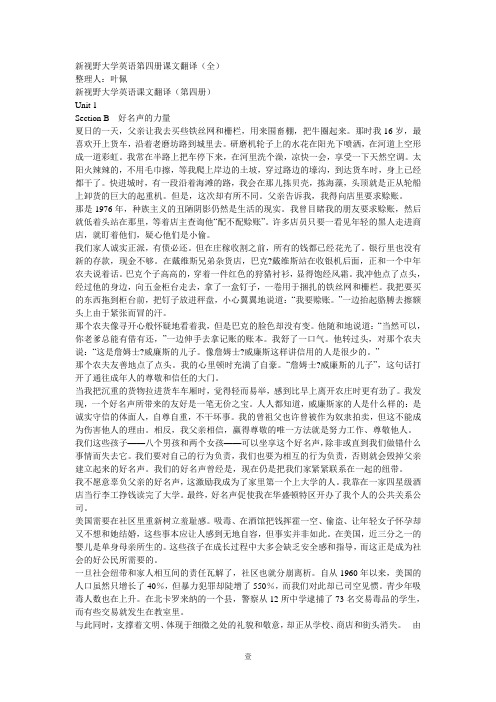
新视野大学英语第四册课文翻译(全)整理人:叶佩新视野大学英语课文翻译(第四册)Unit 1Section B 好名声的力量夏日的一天,父亲让我去买些铁丝网和栅栏,用来围畜棚,把牛圈起来。
那时我16岁,最喜欢开上货车,沿着老磨坊路到城里去。
研磨机轮子上的水花在阳光下喷洒,在河道上空形成一道彩虹。
我常在半路上把车停下来,在河里洗个澡,凉快一会,享受一下天然空调。
太阳火辣辣的,不用毛巾擦,等我爬上岸边的土坡,穿过路边的壕沟,到达货车时,身上已经都干了。
快进城时,有一段沿着海滩的路,我会在那儿拣贝壳,拣海藻,头顶就是正从轮船上卸货的巨大的起重机。
但是,这次却有所不同。
父亲告诉我,我得向店里要求赊账。
那是1976年,种族主义的丑陋阴影仍然是生活的现实。
我曾目睹我的朋友要求赊账,然后就低着头站在那里,等着店主查询他“配不配赊账”。
许多店员只要一看见年轻的黑人走进商店,就盯着他们,疑心他们是小偷。
我们家人诚实正派,有债必还。
但在庄稼收割之前,所有的钱都已经花光了。
银行里也没有新的存款,现金不够。
在戴维斯兄弟杂货店,巴克?戴维斯站在收银机后面,正和一个中年农夫说着话。
巴克个子高高的,穿着一件红色的狩猎衬衫,显得饱经风霜。
我冲他点了点头,经过他的身边,向五金柜台走去,拿了一盒钉子,一卷用于捆扎的铁丝网和栅栏。
我把要买的东西拖到柜台前,把钉子放进秤盘,小心翼翼地说道:“我要赊账。
”一边抬起胳膊去擦额头上由于紧张而冒的汗。
那个农夫像寻开心般怀疑地看着我,但是巴克的脸色却没有变。
他随和地说道:“当然可以,你老爹总能有借有还,”一边伸手去拿记账的账本。
我舒了一口气。
他转过头,对那个农夫说:“这是詹姆士?威廉斯的儿子。
像詹姆士?威廉斯这样讲信用的人是很少的。
”那个农夫友善地点了点头。
我的心里顿时充满了自豪。
“詹姆士?威廉斯的儿子”,这句话打开了通往成年人的尊敬和信任的大门。
当我把沉重的货物拉进货车车厢时,觉得轻而易举,感到比早上离开农庄时更有劲了。
- 1、下载文档前请自行甄别文档内容的完整性,平台不提供额外的编辑、内容补充、找答案等附加服务。
- 2、"仅部分预览"的文档,不可在线预览部分如存在完整性等问题,可反馈申请退款(可完整预览的文档不适用该条件!)。
- 3、如文档侵犯您的权益,请联系客服反馈,我们会尽快为您处理(人工客服工作时间:9:00-18:30)。
新视野大学英语第四册课文翻译(全)整理人:叶佩新视野大学英语课文翻译(第四册)Unit 1Section B 好名声的力量夏日的一天,父亲让我去买些铁丝网和栅栏,用来围畜棚,把牛圈起来。
那时我16岁,最喜欢开上货车,沿着老磨坊路到城里去。
研磨机轮子上的水花在阳光下喷洒,在河道上空形成一道彩虹。
我常在半路上把车停下来,在河里洗个澡,凉快一会,享受一下天然空调。
太阳火辣辣的,不用毛巾擦,等我爬上岸边的土坡,穿过路边的壕沟,到达货车时,身上已经都干了。
快进城时,有一段沿着海滩的路,我会在那儿拣贝壳,拣海藻,头顶就是正从轮船上卸货的巨大的起重机。
但是,这次却有所不同。
父亲告诉我,我得向店里要求赊账。
那是1976年,种族主义的丑陋阴影仍然是生活的现实。
我曾目睹我的朋友要求赊账,然后就低着头站在那里,等着店主查询他“配不配赊账”。
许多店员只要一看见年轻的黑人走进商店,就盯着他们,疑心他们是小偷。
我们家人诚实正派,有债必还。
但在庄稼收割之前,所有的钱都已经花光了。
银行里也没有新的存款,现金不够。
在戴维斯兄弟杂货店,巴克?戴维斯站在收银机后面,正和一个中年农夫说着话。
巴克个子高高的,穿着一件红色的狩猎衬衫,显得饱经风霜。
我冲他点了点头,经过他的身边,向五金柜台走去,拿了一盒钉子,一卷用于捆扎的铁丝网和栅栏。
我把要买的东西拖到柜台前,把钉子放进秤盘,小心翼翼地说道:“我要赊账。
”一边抬起胳膊去擦额头上由于紧张而冒的汗。
那个农夫像寻开心般怀疑地看着我,但是巴克的脸色却没有变。
他随和地说道:“当然可以,你老爹总能有借有还,”一边伸手去拿记账的账本。
我舒了一口气。
他转过头,对那个农夫说:“这是詹姆士?威廉斯的儿子。
像詹姆士?威廉斯这样讲信用的人是很少的。
”那个农夫友善地点了点头。
我的心里顿时充满了自豪。
“詹姆士?威廉斯的儿子”,这句话打开了通往成年人的尊敬和信任的大门。
当我把沉重的货物拉进货车车厢时,觉得轻而易举,感到比早上离开农庄时更有劲了。
我发现,一个好名声所带来的友好是一笔无价之宝。
人人都知道,威廉斯家的人是什么样的:是诚实守信的体面人,自尊自重,不干坏事。
我的曾祖父也许曾被作为奴隶拍卖,但这不能成为伤害他人的理由。
相反,我父亲相信,赢得尊敬的唯一方法就是努力工作、尊敬他人。
我们这些孩子——八个男孩和两个女孩——可以坐享这个好名声,除非或直到我们做错什么事情而失去它。
我们要对自己的行为负责,我们也要为相互的行为负责,否则就会毁掉父亲建立起来的好名声。
我们的好名声曾经是,现在仍是把我们家紧紧联系在一起的纽带。
我不愿意辜负父亲的好名声,这激励我成为了家里第一个上大学的人。
我靠在一家四星级酒店当行李工挣钱读完了大学。
最终,好名声促使我在华盛顿特区开办了我个人的公共关系公司。
美国需要在社区里重新树立羞耻感。
吸毒、在酒馆把钱挥霍一空、偷盗、让年轻女子怀孕却又不想和她结婚,这些事本应让人感到无地自容,但事实并非如此。
在美国,近三分之一的婴儿是单身母亲所生的。
这些孩子在成长过程中大多会缺乏安全感和指导,而这正是成为社会的好公民所需要的。
一旦社会纽带和家人相互间的责任瓦解了,社区也就分崩离析。
自从1960年以来,美国的人口虽然只增长了40%,但暴力犯罪却陡增了550%,而我们对此却已司空见惯。
青少年吸毒人数也在上升。
在北卡罗来纳的一个县,警察从12所中学逮捕了73名交易毒品的学生,而有些交易就发生在教室里。
与此同时,支撑着文明、体现于细微之处的礼貌和敬意,却正从学校、商店和街头消失。
由壹于受到电视和音乐中的脏话的影响,像“是的,女士”、“不,先生”、“谢谢”和“请”这样的话,只会让今天的孩子哈欠连天。
他们对好名声的作用满不在乎。
从父亲那传下来的、由我的兄弟姐妹和我保持的好名声,在现在仍和过去一样地珍贵。
甚至直到今天,当我走进巴克?戴维斯的商店,或去老家的理发店理发时,人们仍然称呼我是詹姆士?威廉斯的儿子。
我们家的好名声确实为我铺平了道路。
新视野大学英语课文翻译(第四册)Unit 2Section B 一位女政治家的政治生涯24岁的阿加莎?墨丹妮?姆波戈,为人谦虚,谈吐温柔,算不上是个革命者的形象。
然而就在6个月前,她做了—件极富革命性的事情:她参加了肯尼亚恩布市的市长竞选,并且当选。
更令人感到意外的是,姆波戈女士是由区议会的同事们投票选出的,而那些人全是男性。
在肯尼亚乃至整个非洲,妇女的政治力量日益壮大。
恩布市是一个位于内罗毕东北部的农业地区,距内罗毕两个小时的车程。
对于生活在此地的数千妇女来说,姆波戈成了这种力量的象征。
1992年,姆波戈女士开始追寻她的从政梦想,她竞选了恩布市议员。
像其他打算从政的非洲妇女一样,她面对着很多阻碍:她缺钱,没有政治经验,要回答许多关于她个人生活的荒唐问题。
她说:“我的对手一口咬定我要与外市的人结婚并搬走。
”姆波戈还要面对本市妇女的误解,她们中间有许多人起初并不愿意为她投票。
她成为捍卫妇女政治权利的使者,向妇女团体发表演说或者挎着手提包挨家挨户去做演讲,并给他们讲解政体,一讲就是数小时。
“她胜出我很高兴,因为是男人们选举了她,”恩布市的一位农民政治活动家利迪亚?基曼尼说。
“这正是我期望的结果,因为它似乎战胜了…女人当不了领导者‟这种观念。
”非洲妇女的教育已经成为政治活动家们着重考虑的问题。
有个机构已经在肯尼亚农村举办了十几次研讨会,目的是帮助妇女理解国家宪法以及民主政治制度的程序及理论。
一位资深的女政治活动家说,许多妇女连参政的最基本知识都没学过。
她说,有人教她们,在竞选运动中谁“给你半公斤面粉、200克食盐或一条面包”,就投票选谁。
妇女政治活动家们说她们正在与根深蒂固的文化传统作斗争。
这些传统要非洲妇女做饭、打扫屋子、照管孩子、种庄稼、收庄稼、支持丈夫。
她们通常不能继承土地,不能与丈夫离婚,不能理财,也不能从政。
然而,肯尼亚妇女从事政治活动并不是什么新现象。
在20世纪50年代争取独立的斗争中,肯尼亚妇女就经常秘密地为部队提供武器并监视殖民军的阵地。
但是独立之后,领导者们唯恐失去自己的权力,将妇女排斥在政界之外。
这种现象在非洲大陆随处可见。
今天,男性仍占有优势。
肯尼亚妇女占选民人数的60%,但在国民大会中的席位仅有3%。
从来没有一位肯尼亚妇女担任过内阁职务。
在这种背景下,阿加莎?姆波戈开始了她的政治生涯。
在赢得议会席位之后,她拒绝了被同事称为“女人委员会”的教育及社会服务委员会的职位,而加入了城市规划委员会。
这是个更显眼的工作。
接着,在去年,她决定挑战恩布市市长,一位资深政客。
姆波戈女士说,为肯尼亚乡村地区提供大量捐助的团体“不愿意到这里来”,为此她感到很失望。
“我们没看到有人为社区办过什么事,”她说。
“这是一件丑闻,捐资者的钱似乎落人了个人腰包。
”经过一场激烈的竞选,她以7比6的选票当选。
她说恩布市的妇女为此兴高采烈,而男人们贰则很不解,有些甚至心怀敌意。
她回忆说,男人们不解:那些男人怎么会选一个女人?但姆波戈女士并没有像其他女政治家那样受到攻击。
有些女政治家曾说她们的支持者有时在集会后会受到棍棒袭击。
去年6月,肯尼亚警方企图驱散在内罗毕西北部举行的一次妇女政治集会,坚持说它是非法的,可能引发骚乱。
目击者报告说,当时有100名妇女,包括一名国民大会委员。
她们拒绝离开,于是警官扯下她们的标语,并对她们棒打拳击。
与此相反,姆波戈女士通常受到恩布市男士们的热烈欢迎,许多人说现在很高兴议会选择了她。
如今,捐助团体正式给恩布市的若干项目提供了资金。
在市中心建起了一个新市场。
医院新增添了有200个床位的产房。
为几十个流浪街头、无家可归的孩子建起了集体宿舍。
姆波戈女士对这个市场和医院感到特别自豪,因为“它们对妇女有很大的影响”。
在现在的市场上,数以百计的人在遮阳伞下摆卖果蔬。
一个卖柠檬的妇女说她喜欢新市长。
“我感觉如果碰到问题,我可以到她的办公室去找她,”她说。
“以前的市长呼来喝去,好像是个皇帝,他并不想听我的问题。
”旁边,有个男人说他发觉姆波戈女士带来了一种清新的变化。
“我厌倦了男人,”看着自己那一大堆洋葱,他说。
“他们只会许诺,但没有带来实际的东西。
只要她能不断带来我们所需的东西,她就行。
”新视野大学英语课文翻译(第四册)Unit 3Section B 盲人帮我看到了美妙的世界已经是下午很晚了,我们驻曼谷公司的主席分配给我一个任务:我必须在第二天出发陪一位重要的中国商人到泰国北部的旅游点。
我眼睛瞪着桌子,心里直冒火。
桌上成堆的文件足以证明,尽管我一周七天都在工作,可还有大量的工作等着我去做。
我真不知道如何才能把这些活儿赶出来。
第二天早晨,坐了一个小时飞机后,我们当天就与其他数以百计的游客一起,参观了一些景点。
他们大多数都带着相机,满载着小礼物。
我仍记得那天挤在密集的人群中,心里很恼火。
当天晚上我和这位中国伙伴一起坐上了旅游包车去吃晚饭、看表演。
那场表演我以前看过许多次了。
他跟其他游客聊着天,我则在黑暗中礼貌地跟一位坐在我前面的男士谈话。
他是位比利时人,讲一口流利的英语。
当时我感到奇怪,为什么他的头一动不动地保持着一个古怪的角度,好像在祷告一样。
后来我恍然大悟,他是个盲人。
我身后有人打开了灯,我看到了他浓密的银发,还有方正有力的下巴。
他的双眼里似乎有一层白膜。
"我吃饭时能坐在您的旁边吗?" 他问道。
"我很想您能把看到的向我略作介绍。
" "我很乐意,"我回答说。
我的客人与几位新交的朋友径直走进了餐馆,我和这位盲人跟了进去。
我用手搀着他的肘部给他领路,但他昂首挺胸地前行,没有丝毫的犹豫或屈从,好像是他在给我带路。
我们找了一张靠近舞台的桌子,他要了半升啤酒,我则要了一杯葡萄汽水。
我们正等着饮料时,盲人说:"我们西方人听起来这首乐曲似乎变调了,但还是挺有魅力的,您能描述一下奏乐的人吗?"我并没注意到舞台那头的五个人,他们在奏着演出的开场乐曲。
"他们盘着腿坐在小地毯上,身着宽松的白色棉布衬衫和肥大的黑裤,腰系染成鲜红色的布带。
他们中三个是年轻小伙子,还有一位中年乐手和一位老年乐手。
他们中一个击鼓,另一个奏着木制的弦乐器,另外三个用琴弓拉着一种类似小提琴的小小的乐器。
"光线又暗下来,盲人问:"您的那些游客们都长什么模样?""他们各种国籍、各种肤色都有,体形、个子大小也都不同,简直就是一个人种大聚会,"叁我低声说。
我把声音压得更低,凑近他的耳朵说话,他也热切地把头靠过来。
从来没有人如此强烈地想听我讲话。
"离我们很近的是一位日本老妇人,"我说。
"就在她旁边,有一位黄头发的斯堪的纳维亚男孩,大约五岁,身体往前倾,他的脸刚好在妇人的脸下面。
